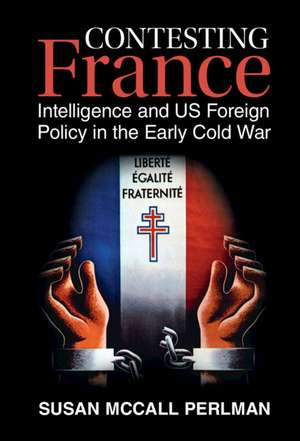Contesting France: Intelligence and US Foreign Policy in the Early Cold War: Cambridge Studies in US Foreign Relations
Autor Susan McCall Perlmanen Limba Engleză Hardback – 8 feb 2023
Din seria Cambridge Studies in US Foreign Relations
-
 Preț: 226.35 lei
Preț: 226.35 lei - 11%
 Preț: 694.04 lei
Preț: 694.04 lei -
 Preț: 208.30 lei
Preț: 208.30 lei -
 Preț: 289.78 lei
Preț: 289.78 lei -
 Preț: 289.87 lei
Preț: 289.87 lei -
 Preț: 230.51 lei
Preț: 230.51 lei -
 Preț: 189.86 lei
Preț: 189.86 lei -
 Preț: 374.10 lei
Preț: 374.10 lei -
 Preț: 179.34 lei
Preț: 179.34 lei -
 Preț: 287.07 lei
Preț: 287.07 lei -
 Preț: 236.02 lei
Preț: 236.02 lei -
 Preț: 271.77 lei
Preț: 271.77 lei - 11%
 Preț: 536.64 lei
Preț: 536.64 lei -
 Preț: 325.16 lei
Preț: 325.16 lei -
 Preț: 227.49 lei
Preț: 227.49 lei -
 Preț: 289.95 lei
Preț: 289.95 lei -
 Preț: 226.17 lei
Preț: 226.17 lei -
 Preț: 181.93 lei
Preț: 181.93 lei -
 Preț: 321.90 lei
Preț: 321.90 lei -
 Preț: 179.53 lei
Preț: 179.53 lei -
 Preț: 211.94 lei
Preț: 211.94 lei -
 Preț: 413.07 lei
Preț: 413.07 lei -
 Preț: 372.00 lei
Preț: 372.00 lei -
 Preț: 405.35 lei
Preț: 405.35 lei
Preț: 406.71 lei
Nou
Puncte Express: 610
Preț estimativ în valută:
77.83€ • 80.96$ • 64.26£
77.83€ • 80.96$ • 64.26£
Carte tipărită la comandă
Livrare economică 14-28 aprilie
Preluare comenzi: 021 569.72.76
Specificații
ISBN-13: 9781316511817
ISBN-10: 1316511812
Pagini: 275
Dimensiuni: 159 x 237 x 24 mm
Greutate: 0.59 kg
Editura: Cambridge University Press
Colecția Cambridge University Press
Seria Cambridge Studies in US Foreign Relations
Locul publicării:New York, United States
ISBN-10: 1316511812
Pagini: 275
Dimensiuni: 159 x 237 x 24 mm
Greutate: 0.59 kg
Editura: Cambridge University Press
Colecția Cambridge University Press
Seria Cambridge Studies in US Foreign Relations
Locul publicării:New York, United States
Cuprins
Acknowledgements; Abbreviations in text; Abbreviations in notes; Introduction; 1. Liberation; 2. Civil war; 3. Restoration; 4. March to power; 5. L'Evénement; Conclusion: How intelligence becomes policy; Notes; Bibliography.
Recenzii
'Perlman offers a revealing examination that decenters Washington and instead provides a deeply researched and beautifully written transnational and trans-imperial history. She recognizes that foreign policy is rarely the result of one voice. Instead, she highlights the myriad of voices, which jockeyed for position within and among, the various government agencies, and countries. This is intelligence history at its best.' Sarah-Jane Corke, Co-Founder and Past-President of the North American Society for Intelligence History and Associate Professor at the University of New Brunswick
'Although intelligence remains international history's 'missing dimension,' Perlman joins a small cadre of scholars committed to filling in the gap. Based on prodigious research in multinational archives, her innovative and masterful Contesting France enhances and complicates our understandings of early cold war history and intelligence's pivotal yet problematic contribution to it.' Richard Immerman, author of The Hidden Hand: A Brief History of the CIA
'By applying a 'trans-imperial' approach to the role of intelligence, Contesting France delivers an innovative, intricate, and convincing insight into the early Cold War. By placing emotion central to the narrative, this book demonstrates just what is possible with a 'new diplomatic history' approach to international relations. An exceptional achievement.' Giles Scott-Smith, Roosevelt Chair in New Diplomatic History, Leiden University
'In this exceedingly well-written and argued book, Perlman's assessment of American anxiety indicates that US intelligence officials had little grasp of internal French political stability, French nationalism, and independence movements in French colonies. This book could not be more relevant in urging us to think about how we gather, use, and abuse intelligence to achieve foreign policy goals.' Kathryn C. Statler, author of Replacing France: The Origins of American Intervention in Vietnam
'Although intelligence remains international history's 'missing dimension,' Perlman joins a small cadre of scholars committed to filling in the gap. Based on prodigious research in multinational archives, her innovative and masterful Contesting France enhances and complicates our understandings of early cold war history and intelligence's pivotal yet problematic contribution to it.' Richard Immerman, author of The Hidden Hand: A Brief History of the CIA
'By applying a 'trans-imperial' approach to the role of intelligence, Contesting France delivers an innovative, intricate, and convincing insight into the early Cold War. By placing emotion central to the narrative, this book demonstrates just what is possible with a 'new diplomatic history' approach to international relations. An exceptional achievement.' Giles Scott-Smith, Roosevelt Chair in New Diplomatic History, Leiden University
'In this exceedingly well-written and argued book, Perlman's assessment of American anxiety indicates that US intelligence officials had little grasp of internal French political stability, French nationalism, and independence movements in French colonies. This book could not be more relevant in urging us to think about how we gather, use, and abuse intelligence to achieve foreign policy goals.' Kathryn C. Statler, author of Replacing France: The Origins of American Intervention in Vietnam
Notă biografică
Descriere
The untold story of how intelligence shaped US perceptions and policy towards France during the early Cold War.
